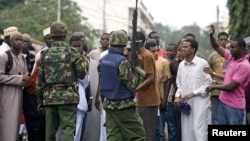NAIROBI — Security has been restored in the Kenyan city of Mombasa after heavy rioting early this week. On Monday, the assassination of Muslim cleric Aboud Rogo Mohamed triggered the protests, but analysts believe the perceived marginalization of coastal communities underlie the unrest.
The streets of Mombasa, patrolled by security forces, were calm on Friday after widespread rioting earlier in the week.
On Monday, the assassination of Muslim cleric Aboud Rogo Mohamed triggered two days of riots in the coastal Kenyan city, leaving at least four dead and dozens injured.
Abdullahi Halakhe, the Kenya analyst with the International Crisis Group, believes the assassination provoked the unrest, but that there are deeper issues at hand.
Riots uncover deeper problems
“The entire coastal region feels extremely disenfranchised by the state," said Halakhe. "They feel like they are internally colonized by the Kenyan state. They can go through a list of issues that they feel like the state has done economically and otherwise to marginalize them.”
These grievances include insecurity over land ownership and unemployment. In addition, human rights groups accuse the Kenyan police of committing several extrajudicial killings over past few years, in the name of counterterrorism.
An unidentified gunman shot Mohamed, an alleged supporter of the Somali militant group al-Shabab, as he drove a van carrying his family.
Halakhe said Kenya's government appears not to mind when violence in the name of counterterrorism takes place in the country.
Counterterrorism profitable?
“Over the last few years the Kenyan government has realized there is a lot of money to be made when they participate in counterterrorism activity," said Halakhe. "We have traded good governance and human rights for counterterrorism and that is a very dangerous road, particularly if we go towards the election.”
President Mwai Kibaki traveled to Mombasa on Thursday to attend an agricultural trade fair. He cautioned against sectarian violence, echoing statements made by Prime Minister Raila Odinga the day before in the same city.
An estimated 1,300 people were killed in riots and ethnic violence that followed Kenya's disputed 2007 presidential election.
Analysts and ordinary Kenyans alike have expressed worry that more violence could be triggered by the next elections, scheduled for March of next year.
The streets of Mombasa, patrolled by security forces, were calm on Friday after widespread rioting earlier in the week.
On Monday, the assassination of Muslim cleric Aboud Rogo Mohamed triggered two days of riots in the coastal Kenyan city, leaving at least four dead and dozens injured.
Abdullahi Halakhe, the Kenya analyst with the International Crisis Group, believes the assassination provoked the unrest, but that there are deeper issues at hand.
Riots uncover deeper problems
“The entire coastal region feels extremely disenfranchised by the state," said Halakhe. "They feel like they are internally colonized by the Kenyan state. They can go through a list of issues that they feel like the state has done economically and otherwise to marginalize them.”
These grievances include insecurity over land ownership and unemployment. In addition, human rights groups accuse the Kenyan police of committing several extrajudicial killings over past few years, in the name of counterterrorism.
An unidentified gunman shot Mohamed, an alleged supporter of the Somali militant group al-Shabab, as he drove a van carrying his family.
Halakhe said Kenya's government appears not to mind when violence in the name of counterterrorism takes place in the country.
Counterterrorism profitable?
“Over the last few years the Kenyan government has realized there is a lot of money to be made when they participate in counterterrorism activity," said Halakhe. "We have traded good governance and human rights for counterterrorism and that is a very dangerous road, particularly if we go towards the election.”
President Mwai Kibaki traveled to Mombasa on Thursday to attend an agricultural trade fair. He cautioned against sectarian violence, echoing statements made by Prime Minister Raila Odinga the day before in the same city.
An estimated 1,300 people were killed in riots and ethnic violence that followed Kenya's disputed 2007 presidential election.
Analysts and ordinary Kenyans alike have expressed worry that more violence could be triggered by the next elections, scheduled for March of next year.
